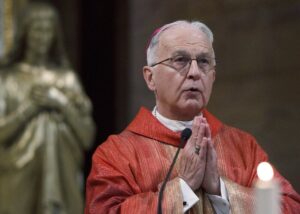
CNS file photo
GARY, Indiana (CNS) –Bishop-Emeritus Dale J. Melczek of the Diocese of Gary, who wrote two pastoral letters that addressed racism and took an active role in building understanding across racial lines throughout his tenure, died Aug. 25. He was 83.
The pastoral letters, issued in 2002 and 2003, invited the people of the diocese to attend parish-based discussions that allowed parishioners to examine the gifts of their diverse ethnic and racial cultures to the Catholic Church and to society.
Current Bishop Robert J. McClory of Gary described Bishop Melczek, the third bishop of Gary, as a "true shepherd who loved his flock in the Diocese of Gary."
"He was a tireless servant and a compassionate pastor. We have been blessed tremendously to have such a hopeful and caring leader," Bishop McClory said.
"Until his last days, Bishop Melczek was still looking forward for new ways to share the love of Jesus in Northwest Indiana," he added. "We now entrust him to the love of Jesus so that he may be drawn forward into the Lord's eternal embrace."
A funeral Mass was celebrated Aug. 29 at the Cathedral of the Holy Angels in Gary. Interment followed in the cathedral.
"Knowledge is transformational, and Bishop Dale knew this as reflected by his episcopal motto, 'To Know Christ,'" said Archbishop Charles C. Thompson of Indianapolis in his homily. "Through knowing Christ, (Bishop Dale) came to know his own identity and desired to share that knowledge with all whom he met. It was the rarest of knowledge, sacred wisdom ... prayer, Scripture and service to others."
In his funeral remarks, Bishop McClory read parts of a letter sent to the Gary Diocese on behalf of Pope Francis, which said the pontiff was "saddened" to learn of the bishop's death.
The pope offered "prayerful condolences to your clergy and lay faithful" while recalling Bishop Melczek's "many years of devoted episcopal service, zeal for education and a commitment to fostering a lay apostolate."
Bishop McClory, the fifth bishop of Gary, recalled his first memory of his predecessor as "the running priest" who lived in the same neighborhood in Detroit as the McClory family.
Not only did Bishop Melczek keep himself physically fit throughout his life, "he (also) kept himself spiritually fit" by keeping his focus on Christ, Bishop McClory said.
St. John Paul II appointed Bishop Melczek as apostolic administrator of the Gary Diocese Aug. 19, 1992, because of the failing health of Bishop Norbert F. Gaughan. He was appointed coadjutor bishop Oct. 28, 1995, and officially became the diocesan bishop June 1, 1996. He retired Nov. 24, 2014.
Prior to arriving in Gary, he served for nearly a decade as an auxiliary bishop in the Archdiocese of Detroit where he served as an episcopal vicar, and had administrative and pastoral responsibilities for 80 parishes. He also coordinated St. John Paul II’s visit to Detroit in September 1987.
Born in Detroit Nov. 9, 1938, Bishop Melczek was the eldest of Aloysius and Geraldine Melczek's three children. He earned a master of divinity from St. John Provincial Seminary in Plymouth, Michigan.
He was ordained to the priesthood June 6, 1964, and ministered in parishes until 1975 when he was appointed to serve as the assistant vicar for parishes. In 1977, he was appointed priest-secretary and vicar general for the Detroit Archdiocese under Cardinal John F. Dearden and later Cardinal Edmund C. Szoka.
In Gary, Bishop Melczek initiated lay ecclesial ministry and permanent diaconate programs. He asked parishes to implement active parish pastoral councils and commissions, the Rite of Christian Initiation of Adults, and youth and adult faith-formation programs. Bishop Melczek implemented a diocesan pastoral council, a clergy council and four lay deanery councils.
Colleagues also recalled Bishop Melczek for his tireless advocacy of Catholic schools. He founded the Catholic Foundation for Northwest Indiana and established endowment funds for each of the three Catholic high schools in the Gary Diocese to ensure their financial future.
In 2002, Bishop Melczek began to address the sin of racism in Northwest Indiana with the release of his first pastoral letter, "The Many Faces of Our Church: a Pastoral Letter on Cultural Diversity."
The following year, he wrote another pastoral letter, "Created in God's Image: a Pastoral Letter on the Sin of Racism and a Call to Conversion." It was followed by parish-based discussions, diocesan-wide listening sessions and a diocesan liturgy of atonement. He also co-chaired the Race Relations Council of Northwest Indiana from 2002 to 2007.
